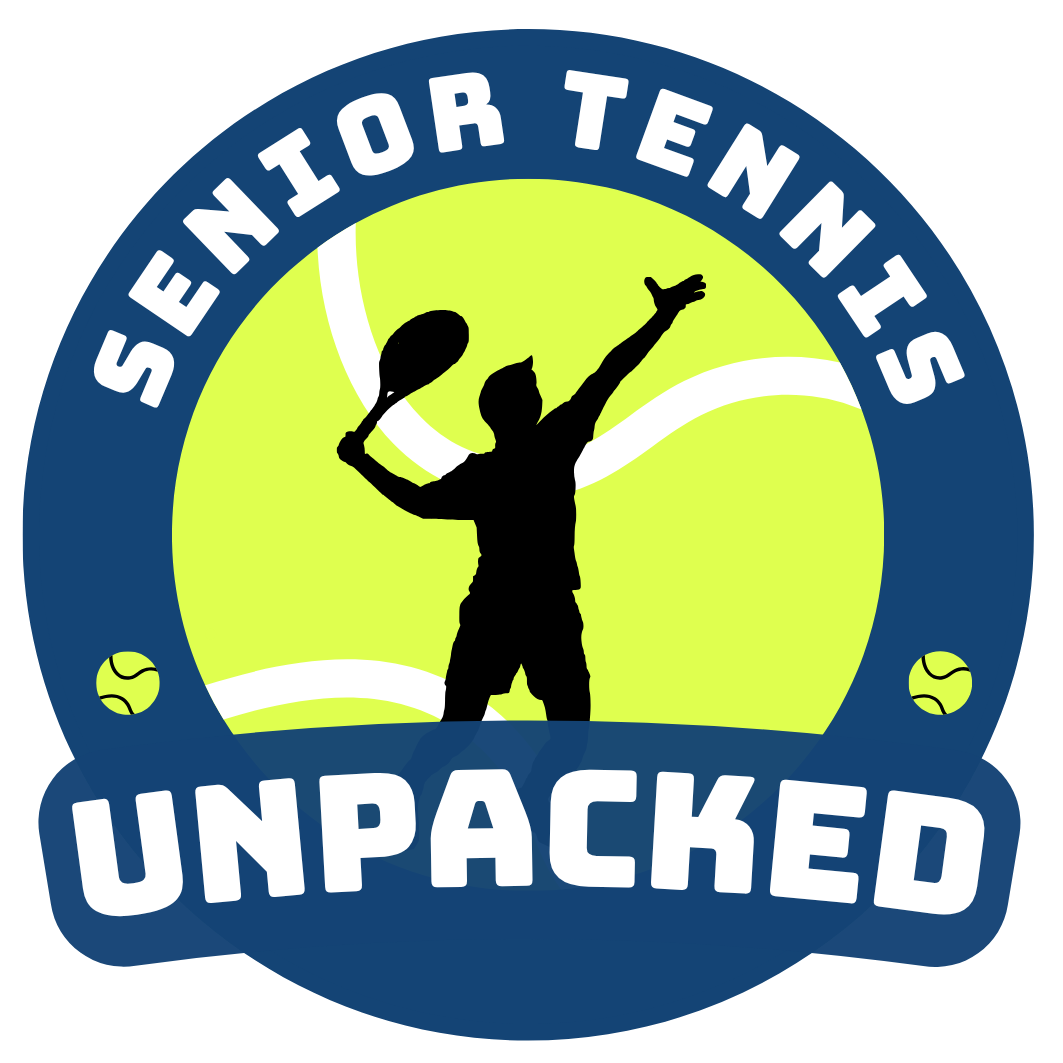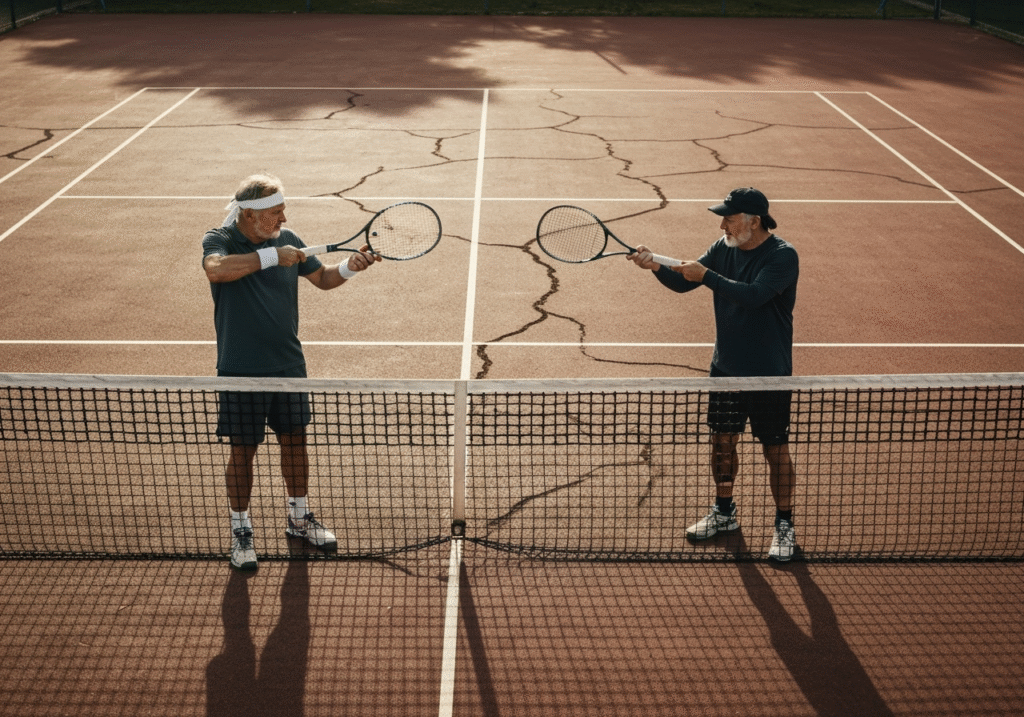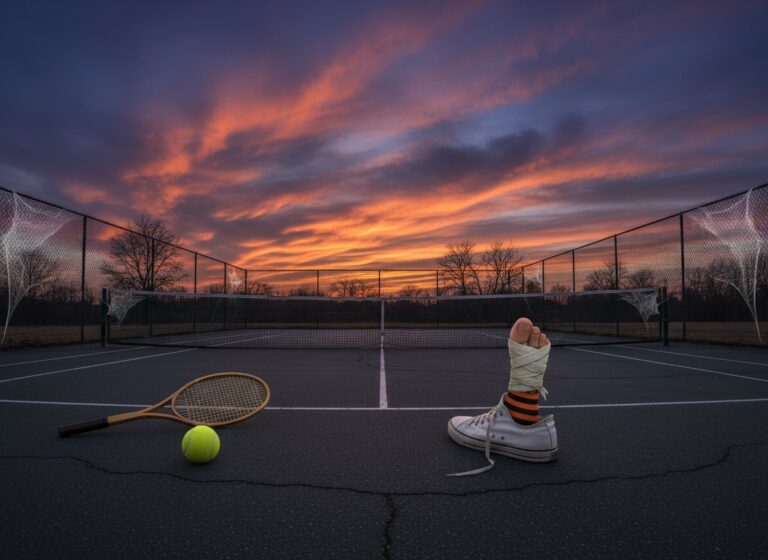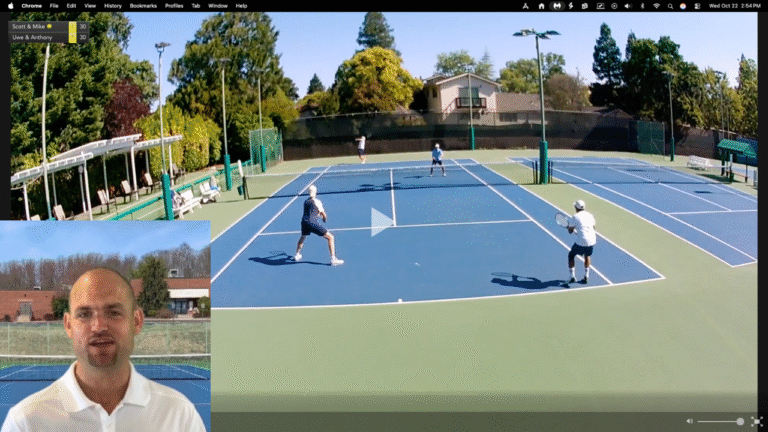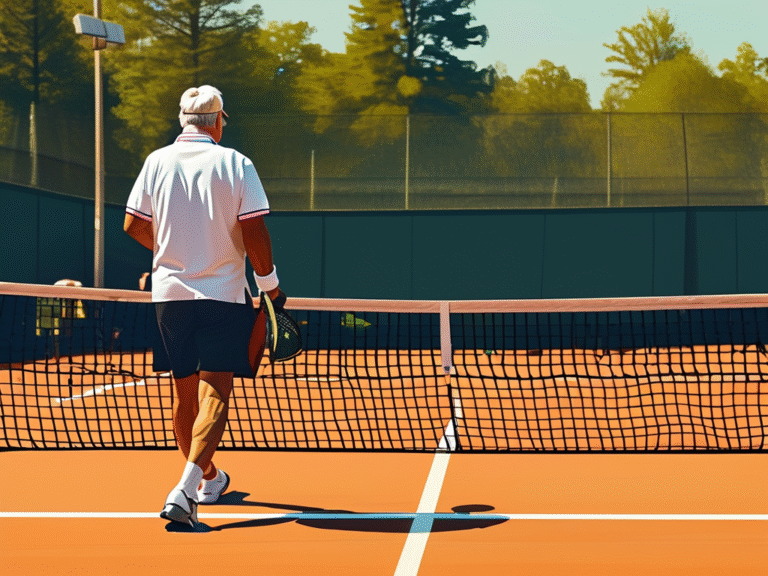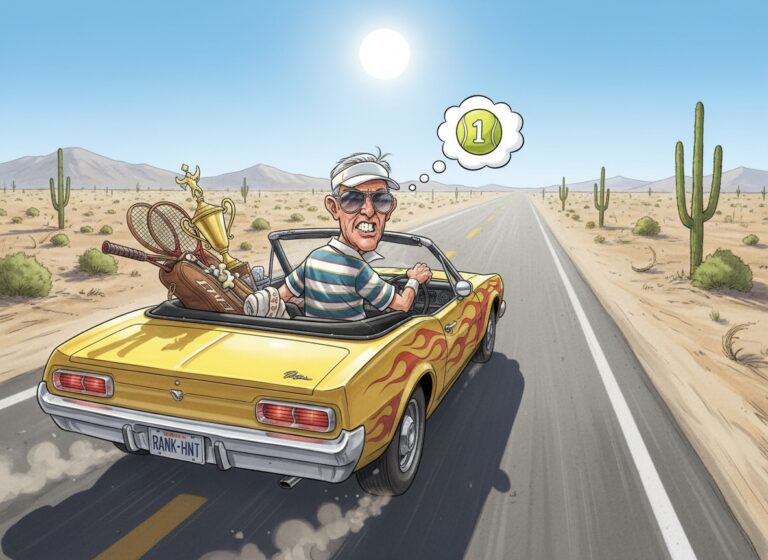Let’s be clear about something up front: I did not walk off the court arm in arm with my arch rival. We did not split a smoothie afterward while laughing about our forehand grip choices. This was not a feel-good tennis movie ending with slow-motion applause and reconciliation over a shared love of the game.
But it also wasn’t the bloodbath I had mentally prepped for.
Let me back up.
Our Not-So-Golden History
If you’ve been playing senior tennis long enough, chances are you’ve got one: the rival. The guy who brings out the very best in you—or more often, the very worst. Someone whose mere presence across the net causes your strings to tighten and your blood pressure to spike.
Mine? Let’s call him “Craig.” That’s not his real name, but it’s close enough that if he ever reads this, he’ll know. And that’s fine. He knows we’ve had issues.
Let’s just say our last three encounters in tournaments almost got to the unsupervised cage match stage and the tournament referee had to step in—not to break up a fight, but to make our line calls. That’s right. We had so little trust in each other that the ref became a mediator for the remainder of the match. Just picture it: two grown men in their 60s, arguing over whether a fuzzy yellow ball nicked the back edge of the line.
Not our finest moment.
I walked off those matches more angry at Craig than disappointed in myself. Which is saying something, because I’ve had a lot of practice being disappointed in myself after matches. But with him, it was personal. I’d find myself reliving not just the scoreline, but every dubious call he made. Or worse, every legitimate call I was sure was wrong. You know that feeling: “I didn’t lose. I was robbed.”
So, when the tournament draw came out and I saw we were once again set to meet in the finals, I did what any mentally tough senior athlete would do—I immediately began stress-snacking and reviewing footage like I was preparing for a deposition, not a tennis match.
Game On… or Is It?
I showed up fully expecting tension. I had practiced my fake smile. I had a fresh can of balls (to avoid arguing about bounce). I even rehearsed a sarcastic “good luck” in case he opened with something passive-aggressive.
But when the match started… nothing happened.
I mean, we played. We warmed up, we hit balls, we started games. But there was no smirking, no glaring, no audible sighs after calls. A couple balls were close—one I called out that might’ve clipped the back of the line, one he called out that I thought was probably good. But neither of us exploded. Neither of us summoned the tournament director like we were lodging a formal complaint with HR.
We just kept playing.
I was so thrown off by the lack of drama, I almost forgot to be irritated. And then something even weirder happened: I started playing… well.
Not great, mind you—this isn’t a miracle story. But better. I cut down on errors. I stayed away from my usual temptation to go for ridiculous low-percentage winners on the run. My feet moved. My shot selection resembled that of a person who had actually played the sport before. For me, that’s progress.
The score? I lost. Straight sets. Not lopsided, but not tight enough to make him sweat. And still, I walked off the court not thinking about Craig, or line calls, or conspiracy theories about where he learned his questionable gamesmanship.
I walked off thinking: Huh. I actually played a smarter match.
Less Drama, More Data
There’s something about rivalry that distorts your tennis brain. You stop thinking in terms of patterns, percentage plays, or momentum. You start thinking in terms of grudges, narratives, and how great it’ll feel to hit an overhead right at the guy’s shoelaces.
But this time, with the emotional fire turned down a few notches, I could truly see my game.
I saw that my cross-court forehand was holding up under pressure. I noticed that when I picked smarter targets on second serves—like to his backhand—I got rewarded with shorter replies. I saw that slicing low to his backhand kept him from dictating play.
Was I perfect? No. But I didn’t unravel. I didn’t feed him errors like hors d’oeuvres. I made him earn it.
And that’s a small, private win.
Civil Isn’t the Same as Friendly
Now don’t get me wrong—we’re not suddenly besties. There was no post-match hug. We didn’t “kibitz,” as they say. We each packed up our gear and went our separate ways like two diplomats after a tense summit: polite, professional, but not exactly planning a joint doubles outing.
But still… it was better.
We were civil. And maybe civility is the new friendship when it comes to tennis rivals over 60. We’ve both been around long enough to know we’re going to see each other again—at regionals, sectionals, Nationals, wherever guys like us chase ranking points and redemption. There’s no getting rid of each other.
So maybe this match was a ceasefire. A détente. The beginning of a cold peace based on mutual exhaustion and the shared knowledge that neither of us wants to deal with another referee making calls like it’s a Davis Cup match.
What I Really Won
Here’s the thing I’m slowly learning, match by match, error by error: improvement isn’t always about rankings, trophies, or who comes out on top.
Sometimes the win is internal.
This match was a loss on paper. But I didn’t spiral. I didn’t play angry. I didn’t sabotage myself with ego-driven shot selection or reheated resentment. I played the ball, not the man. I made better decisions. I found a level of focus that usually only shows up three games after I’ve already lost a set.
And after it was over, I wasn’t mad. I wasn’t replaying bad calls in my head like courtroom exhibits. I was just… thinking about how I played. How I played.
That’s a small miracle for someone like me. Usually, I come off a match against Craig with steam coming out of my ears and a long list of excuses. This time, I came off with insights and a slightly better attitude.
Where Do We Go From Here?
I’m not saying we’re going to hug it out at the next tournament. But I am saying this match gave me a little hope. Hope that even rivalries can evolve. Hope that maybe we’ve both matured—if not as men, at least as tennis players.
Maybe the next time we meet, it’ll be even cleaner. Maybe one day we’ll actually shake hands without a grudge in our grip.
Or maybe not.
But either way, I’ll be showing up with a better mindset, a smarter game plan, and hopefully fewer unforced errors—on the court and in my own head.
And if nothing else, I’ll have a new story to tell. One where the fireworks didn’t go off—but the forehands finally did.
Your Turn — Got a Rival Story?
Have you ever had a tennis rival you just couldn’t stand—but somehow kept running into on the court? Maybe it ended in a handshake, maybe it ended in a line call argument that still lives rent-free in your head.
I’d love to hear your story—what happened, how you handled it, and whether it changed anything for you as a player (or person).
Share your story in the comments or join us in the Senior Tennis Unpacked Nation Facebook Group where we trade tales from the court, laugh about the not-so-glorious moments, and remind each other we’re all in this grind together.
Let’s keep building something great—one story (and one second serve) at a time.
